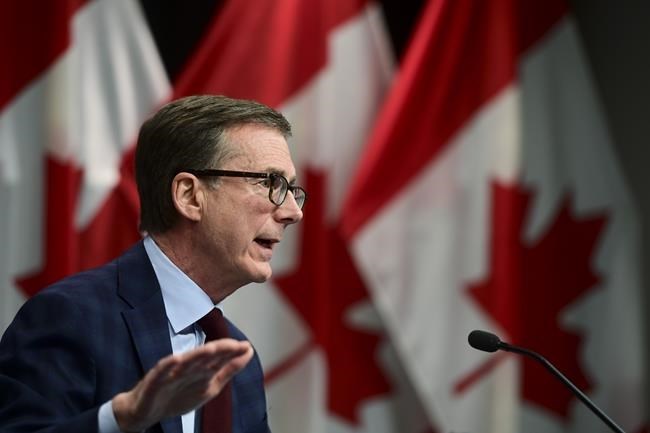OTTAWA — Bank of Canada governor Tiff Macklem says different groups of Canadians experience price increases uniquely, and that the central bank will keep that in mind as it decides on a policy framework for the next five years.
For three decades, the central bank has set its interest rate target with the goal of keeping inflation at two per cent, but it reviews its inflation-management mandate every five years.
This year, the bank opened consultations to a wider group, which Macklem said provided officials with more insight into how Canadians see price increases and interest rates.
For one thing, he said, it became clear that Canadians don't like interest rates too high or too low, and want a balance between some return on their savings and making sure the cost of borrowing isn't too high.
Macklem said experiences with prices can vary between low-income and high-income households, and between households in urban and remote communities.
He said that feedback will work its way into the bank's decision on whether to stick to its current inflation-targeting regime or advise the government that it should take additional factors into account.
The comfort zone the bank sets for its inflation target will help determine what happens to its key policy interest rate, which can affect the rates charged for mortgages and loans.
The last decade has seen a change for central banks with a shift to a low-interest rate environment after the 2008-2009 global financial crisis.
Central banks have also looked to unconventional tools to push money into the economy and drive down the cost of borrowing for consumers and businesses, just as the Bank of Canada has done over the past year with its bond-buying program.
"We're probably going to be in this low interest rate environment for a considerable (period of time). It looks like a bit of a regime shift. We're probably going to be using those tools more frequently," Macklem said.
The summary on consultations said the majority of participants favoured having the bank keep inflation at an annual target, finding steady and predictable price increases best for their own financial planning.
There was openness to the bank aiming to hit its target over a longer period, so that despite periods of fast and slow price increases, overall inflation averages a specific amount over time.
Experts the bank has consulted and average Canadians favoured this alternative framework among others presented, but both groups worried what the ups and downs would mean for household finances, even if it meant economic stability overall.
There was an argument for the bank to help grow the job market, with support from some parliamentarians in the consultations, but the idea wasn't seen as feasible given the bank's current set of policy tools.
Employment is part of the bank's policy thinking, Macklem said, adding that some Canadians want the central bank to be more explicit on the subject in its communications.
"Full employment and low, stable inflation go hand-in-hand," Macklem said.
"If you don't have full employment, those missing jobs, those missing incomes, are going to put downward pressure on inflation, and you're going to get pulled down below your target."
Inflation over the last year has remained below the central bank's target zone, hitting a pandemic-era high of 1.1 per cent in February. But the bank's report noted the belief from participants that prices are rising faster than the official reading of Statistics Canada's consumer price index.
Perceptions on inflation can diverge from official statistics based on what people are buying, be it everyday goods like groceries or larger purchases like a car that may happen every few years, Macklem said.
More recently, the bank's report notes, participants voiced concerns in particular about the rising cost of housing in cities that they felt was increasing "far beyond" the two per cent inflation target.
The price of homes doesn't factor into inflation as directly as many people think, Macklem said, saying the measure reflects the costs to maintain a house that are smoother over time than purchase prices.
"We need to understand the different inflation experiences of different communities of Canadians," he said.
"Part of that is being transparent, being accountable, explaining these things and explaining why we do what we do."
This report by The Canadian Press was first published March 31, 2021.
Jordan Press, The Canadian Press

